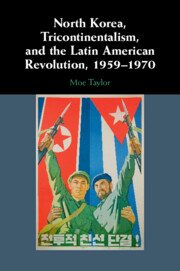Book contents
- North Korea, Tricontinentalism, and the Latin American Revolution, 1959–1970
- North Korea, Tricontinentalism, and the Latin American Revolution, 1959–1970
- Copyright page
- Dedication
- Contents
- Acknowledgements
- Abbreviations
- Introduction
- 1 North Korea and the Cuban Revolution, 1959–1965
- 2 Building the Anti-imperialist, Anti-US United Front, 1966–1970
- 3 Solidarity with the Latin American Revolution
- 4 North Korea as a Model of Development
- 5 North Korea as a Model of Development
- 6 North Korea as a Model of Revolution
- 7 The End of the Anti-imperialist, Anti-US United Front
- Conclusion
- Index
1 - North Korea and the Cuban Revolution, 1959–1965
Published online by Cambridge University Press: 18 May 2023
- North Korea, Tricontinentalism, and the Latin American Revolution, 1959–1970
- North Korea, Tricontinentalism, and the Latin American Revolution, 1959–1970
- Copyright page
- Dedication
- Contents
- Acknowledgements
- Abbreviations
- Introduction
- 1 North Korea and the Cuban Revolution, 1959–1965
- 2 Building the Anti-imperialist, Anti-US United Front, 1966–1970
- 3 Solidarity with the Latin American Revolution
- 4 North Korea as a Model of Development
- 5 North Korea as a Model of Development
- 6 North Korea as a Model of Revolution
- 7 The End of the Anti-imperialist, Anti-US United Front
- Conclusion
- Index
Summary
By early 1965, new dynamics were taking shape within the international communist movement. Cuba and North Korea were at the forefront of this challenge. Relations between the two countries date back to the Korean War, when many Cubans, like young people across Latin America, mobilized to prevent their countries from joining the US-led war effort. When the Cuban Revolution of 1959 brought the island into the socialist camp, a bond began to grow between the Cuban and North Korean leaderships reflective of their shared history of anti-colonial struggle, and their common interests as small countries within a community of socialist states dominated by the Soviet Union and China. Political, cultural, and economic cooperation between Havana and Pyongyang grew steadily, including Che’s historic visit to North Korea in December 1960. By 1965, a nascent Third Worldist tendency affirming its independence from the two major socialist powers was coalescing around North Korea, Cuba, and North Vietnam. At its core was the conviction that it was those on the frontlines of the anti-imperialist struggle which most clearly recognized the true historic task at hand: the defeat of US imperialism.
Keywords
- Type
- Chapter
- Information
- Publisher: Cambridge University PressPrint publication year: 2023

